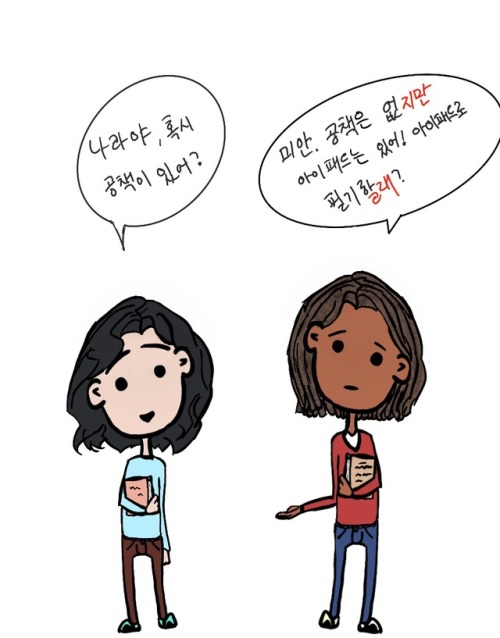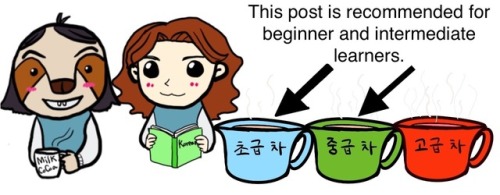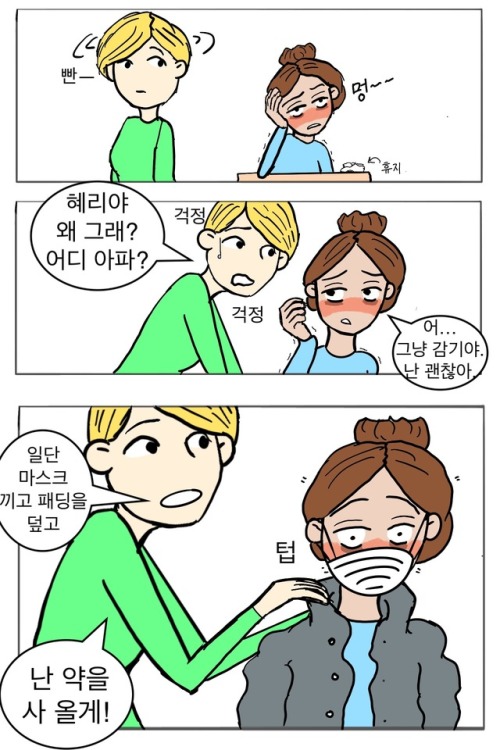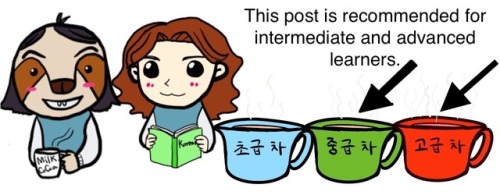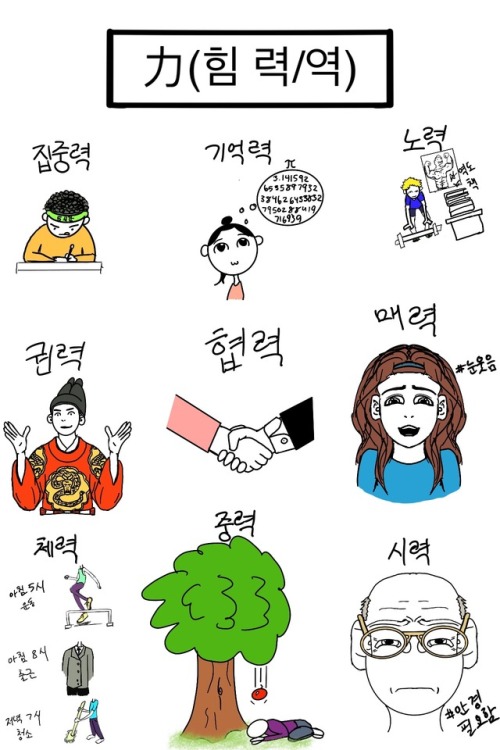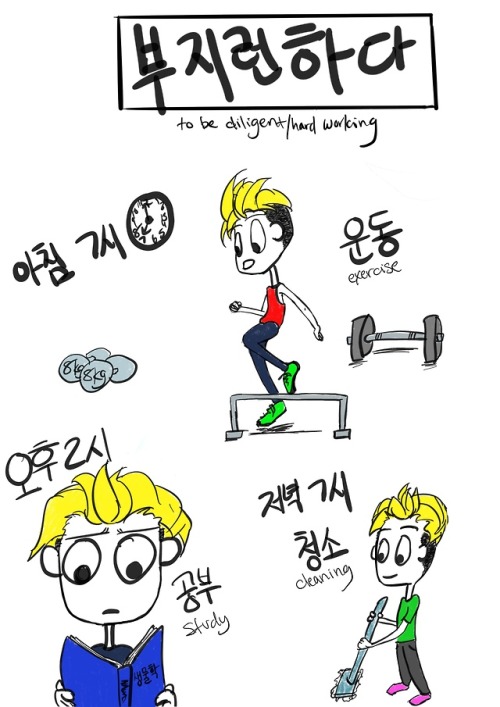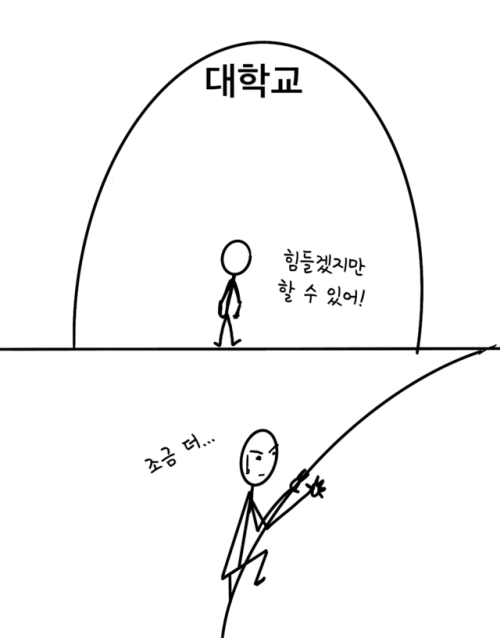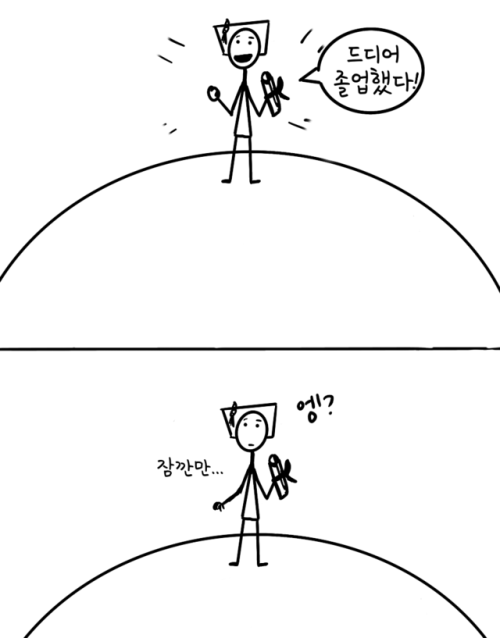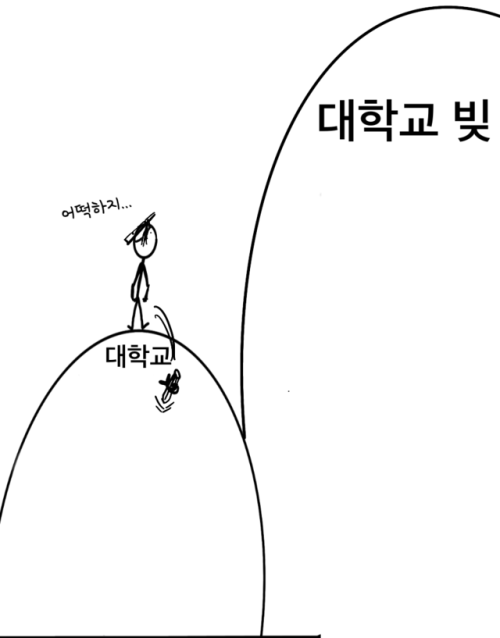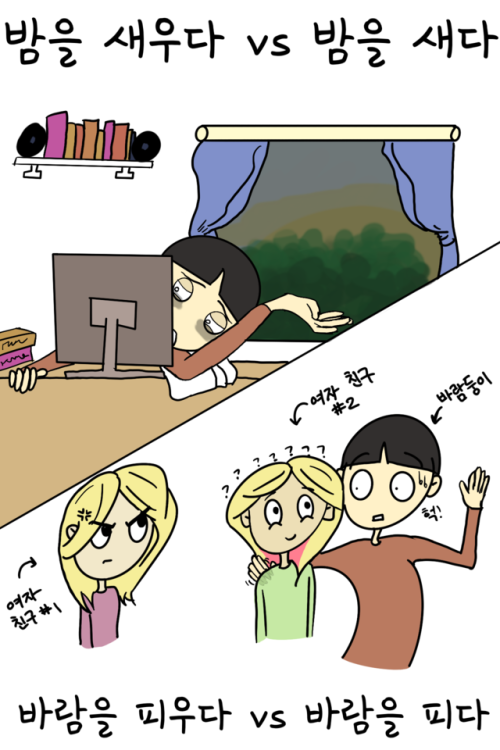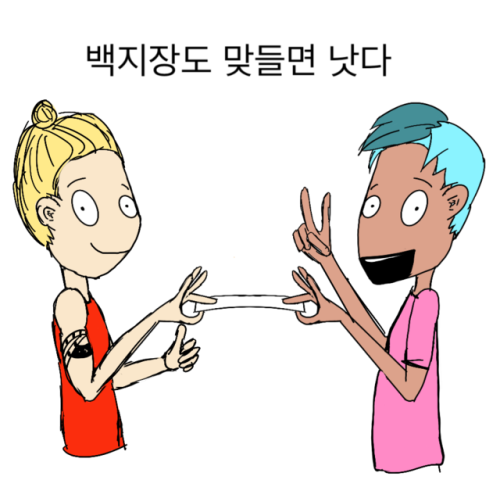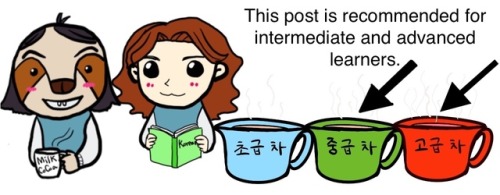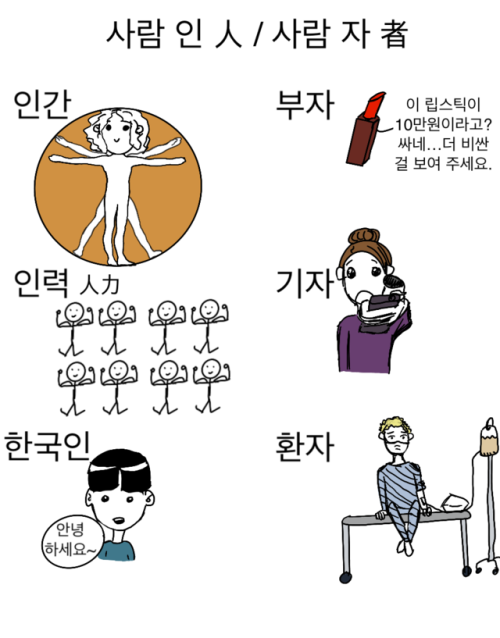#한국어공부중
VOCABULARY WORDS #2 (어휘)
Family - 가족
Grandfather - 할아버지
Grandmother - 할머니
Father - 아버지
Mother -어머니
Younger brother - 남동생
Younger sister - 여동생
Son - 아들
Daughter - 딸
Husband - 남편
Wife - 아내
Younger sibling - 동생
(from a male perspective)
Older brother -형
Older sister - 누나
(from a female perspective)
Older brother - 오빠
Older sister - 언니
Interrogative pronouns
Who - 누구
Who - 누가 (누구+가(subject marker))
What - 무슨
Personal pronouns
My - 나의 / 내 /제
Our - 우리
(honorific)
This person - 이분
That person - 그분
That person - 저분
Other helpful vocabulary words:
Company - 회사
To work for / to go to - 다니다
Flower - 꽃
Rose - 장미
Library - 도서관
Morning - 아침
Nurse - 간호사
Counting unit for people - 명
College student - 대학생
To love - 사랑하다
to be right - 맞다
Really - 정말
Photograph - 사진
To be pretty - 예쁘다
To marry - 결혼하다
Last year - 작년
[ActiveKorean2]
VERB PER DAY #3
하다 - to do
Past tense - 했어요
- A:어제 뭐 했어요?
- What did you do yesterday?
- B:나의 숙제를 했어요.
- I did my homework.
어제 - yesterday
뭐 - what
나의 - my
숙제 - homework
Present tense - 해요
- A:무슨 일을 해요?
- What work do you do?
- B: 저는 의사예요.
- I am a doctor.
무슨 - what; what type; what kind
일 - work
의사 - doctor
Present progressive - 하고 있어요
- A:뭐 하고 있어요?
- What are you doing?
- B:운동을 하고 있어요.
- I am exercising.
운동 - exercise (noun)
Future tense - 할 거예요
- A:너 왜 이렇게 빨라요?
- Why are you so fast?
- B:제 친구가 기다려서 내가 이거를 그냥 빨리 할 거예요.
- My friend is waiting so I’ll just do this quickly
너 - you
왜 - why
이렇게 - so; in a manner; in a way; like this
빠르다 - to be fast (빨라요 - present tense)
제 - my
친구 - friend
기다리다 - to wait
이거 - this
그냥 - just
VERB PER DAY #1
먹다 - to eat
Past tense - 먹었어요
- 저는 어제 피자를 먹었어요.
- I ate pizza yesterday.
Present tense - 먹어요
- 오후 열두 시에 점심을 먹어요.
- I eat lunch at 12 pm.
Present progressive - 먹고 있어요
- 지금 빙수를 먹고 있어요.
- I am eating bingsu now.
Future tense - 먹을 거예요
- 나중에 친구들이랑 냉면을 먹을 거예요.
- I will eat naengmyeon later with my friends.
VOCABULARY WORDS #1
The following words are words that are commonly used in a daily conversation. These are helpful and good to know especially to those who are still in a beginner level and to those who are still building up their vocabulary in Korean.
*자주 - frequently / often
*가끔 - sometimes
*거의 - almost
*계속 - continuously
*똑바로 / 바로 - straight
*좀 - please
*가장 - most
*먼저 - ahead / first
*우선 - in the first place
*매우 / 무척 / 아주 - very
*너무 - too / so
*얼마나 - how long/much/many
*정말 - really
*참 - really / very
*많이 - many
*약간 - a few / little
*전혀 - none / not at all
*잘 - well
*일찍 - early
*이따가 - later
*못 / 안 - not
*더 - more
*모두 / 다 / 전부 - all / whole
*또 / 다시 - again / once more
*따로 - separately
*주로 - mainly / usually
*간단히 - simply
*갑자기 - suddenly
*빨리 / 어서 - fast / quickly
*천천히 - slowly
*같이 - together
*벌써 - already
*곧 - soon
*새로 - newly
*금방 - soon
*방금 - just now / seconds ago
*늘 / 항상 - always
*조용히 - quietly
*열심히 - eagerly
*언제나 - whenever
*오래 - for a long time
*없이 - without
*아까 / 좀전에 - a while ago
*특히 / 특별히 - especially
*아직 - yet
*미리 - in advance
*바로 - right now
*직접 - directly
*깜빡 - with surprise
*꼭 - firmly / just
*아마도 - probably
*별로 - particularly
*그냥 - just
*서로 - with each other
anon asked: what’s the difference between 끊다 and 자르다?
Great question! Hopefully my answer helps! Both can mean “to cut” but here’s a better explanation:
One is used abstractly, while the other is used for more concrete situations. When you want to cut something for a recipe, or cut a piece of paper, you use 자르다. When you want to hang up the phone, or quit smoking, you use 끊다.
끊다 - cut (something abstract); not a literal cutting of something
- 이만 끊을게요 - I’ll hang up (on the phone)
- 앞으로 담배를 끊을 거예요 - From now on, I’m going to quit smoking.
자르다 - cut (something concrete); a literal cutting of something
- 종이를 반으로 자르세요 - cut the paper in half
- 이렇게 잘라야 해요 - you should cut it like this
- 머리 잘라서 머리가 짧아졌어요 - my hair got shorter because I cut it
Hope that helps! Happy learning :)
~ SK101
anon asked: hi! i’m still in the process of learning hangul and i know there’s is no specific order to learn korean but what was the easiest route for you? this may sound silly because i’m thinking too far ahead but when/how did you get to the point of not having to use a dictionary or translator for everything? or is that something i’ll always have to do? i’ve only learned one other language and it was spanish. i think i was able to pick up on it quicker because of cognates that are similar to english and i think those also exist for english and korean but i find them more difficult to identify due to the alphabet being different. i hope i didn’t make it sound confusing. thank you for any tips! i appreciate it all
안녕하세요! 늦게 네 질문이 읽어서 미안해요!
이걸 기억하세요: 여러분은 새로운 언어를 배울 때 항상 사전을 사용할 거예요.
만약 한국어를 배우면 다른 사람들마다 다 배우는게 달라요. 우리가 이걸 이미 알고 있었어요. 그렇지만 사람들은 한국어를 대화하지 않으면 한국어를 배우지 못해요. 우리는 “아 한국에 가려고 한국어를 배워"라고 말하지만 한국어를 사용하는 나라에 살지 않아서 한국어를 배우기 어려워요. 우리 한국말로 말해야 돼요. 진짜로요.
저는 한국사람들과 한국어로 대화했기 때문에 한국어를 쉽게 배울 수 있었어요. 매일 한국어 문법과 어휘도 배우는데 한국말을 사용하지 않으면 기억을 못해요. 항상 "쓰기, 읽기가 제일 쉬워"라고 생각하고 듣기, 말하기 연습을 안 했어요. 16 살때부터 한국어를 배우기 시작했어요! 지금 22살이잖아요!! 제가 왜 한국말로 편하게 말할 수 없었을 가요?!
한국말로 대화하지 않았기 때문이에요.
이건 제 충고예요. 만약 한국어를 쉽게 배우고 싶으면 한국말로 해야 돼요. 너가 문법과 어휘도 배워야 되지만 말하기도 해야 돼요. 하루에 5분이라도요
도움이 됐으면 좋겠습니다. 잘 배우세요.
ENG Trans.:
Hello! Sorry for reading your message late.
Remember this: when you’re learning a new language, you will always use a dictionary (in a way, fluency is arbitrary).
If you want to learn Korean, everyone learns different. Of course, we already knew that. However, if a person doesn’t speak in Korean, then they won’t learn Korean. We say things like, “I am learning Korean to go to Korea,” but most of us don’t live in a country that actively uses Korean. That makes it really hard to learn Korean. If we wanna learn, we have to speak Korean. Seriously.
It wasn’t until I spoke to native Korean speakers that I actually learned Korean easily. Everyday, I would learn grammar or vocab but it would mean nothing to me if I didn’t use it. I would forget it. I used to think, “Writing and reading are the easiest,” but I never practiced speaking and listening. I’ve been learning since I was 16!!! I’m 22 now!! Why couldn’t I speak Korean comfortably???
It’s literally because I never spoke in Korean.
This is my advice. If you want to be comfortable in Korean (with or without a dictionary), use it. Learn the vocab and grammar, but you HAVE to speak Korean. Even if it’s just for 5m a day.
I hope this helped! Happy Learning :)
~ SK101
Today, I have two beginner grammar points! A/V지만 and V(으)ㄹ래. They are quite simple, but this post ended up being much longer than I thought it would.
지만 is a way to express opposing situations or “but.” It’s simple and to the point.
Luckily verbs and adjectives are conjugated the same way with 지만.
Present tense: All you have to do is remove the dictionary 다 from the verb/adjective and add 지만.
좋아하다
너를 좋아하지만 우리는 사귈 수 없어. I like you, but we can’t date.
먹다
저는 야채를 잘 먹지만 과일을 잘 안 먹어요. I eat vegetables well (often, a lot), but I don’t eat fruit well (often, a lot).
좋다
이 신발이 좋지만 너무 비싸요. These shoes are good, but they’re too expensive.
나쁘다
그 남자는 성격이 나쁘지만 잘 생겼어요. That guy’s personality is bad, but he’s handsome.
And, it can be used with nouns as well in the form of (이)지만.
Nouns that end in a consonant get followed by 이지만 (ex: 선생님이지만), and nouns that end in a vowel get followed by 지만 (ex: 실례지만).
저는 선생님이지만 어렸을 때 학교 가기 싫었어요. I’m a teacher, but I hated going to school when I was young.
그 사람은 우리 오빠지만 우리는 안 닮았어요. That person is my older brother, but we don’t look alike.
저는 학생이 아니지만 어려 보여서 학생 할인을 받았어요. I’m not a student, but I got the student discount because I look young.
지만 can also be used with the past tense. All you do is add 지만 to the past 았/었/였.
좋아했지만 // 먹었지만 // 좋았지만 // 나빴지만 // 학생이었지만 // 오빠였지만
It can be used with other grammatical constructions as well, but I’ll leave them out to keep this beginner.
———————————————————————————————————
V(으)ㄹ래 is also a rather simple grammar point. When I learned (으)ㄹ래, the book taught it as another future tense “will.” And because of that, I confused it with the other future tenses like (으)ㄹ 거예요 and (으)ㄹ게요. But, luckily they are all quite different from each other in usage. V(으)ㄹ래요 is used when someones will or want is involved. It’s a very strong way to say “I will” do something or “want to” do something.
For example:
A 집에 가서 공부 할 거예요. I will go home and study.
B 집에 가서 공부할래요. I will go home and study.
These two sentences are actually very different. The first sentence (A) just states that you’re going to go home and study, it doesn’t necessarily mean that you want to study at home. It’s just something that will happen. But the second sentence (B) means that this is what you want to do. You want to study at home. It can emphasize that you want to do the action (studying), or it can emphasize that you want to do the action specifically at your house. And probably not where you are now.
Let’s look at another example.
A 나랑 같이 갈 거야? Are you going with me?
B 나랑 같이 갈래? Will you go with me? (Want to go with me?)
These are also very different. Sentence A can be used to ask for information. “Are you going with me?…or with someone else? or…?” But sentence B asks about that persons will. “Will you go with me?/Do you want to go with me?”
Let’s look at some more examples of (으)ㄹ래.
으으…소개팅 하기 싫어. 안 갈래. uhh…I don’t want to have a blind date. I’m not going./I won’t go.
여기 좀 시끄러워서 도서관에 가서 공부할래요. This place is a bit loud, so I’ll go to the library and study.
뭐를 먹을래(요)? What do you want to eat? (informal) 뭐를 드실래요? What do you want to eat? (Formal/respectful)
난 절대 결혼하지 않을래. I will never get married.
너가 가. 난 여기 있을래. You go. I’ll stay here. (I want to stay here./I’m going to stay here.)
note: (으)ㄹ게 also means “I will,” but it’s mostly used when making promises or saying “I will” do something for someone else (favors, promises etc).
A: 문닫아야 겠어. 추워. I better shut the window. It’s cold.
B: 앗 내가 닫아 줄게. Ah, I’ll shut it (for you).
If I say, 내가 닫을래/닫아 줄래 (I will shut it/I will shut it for you), it sounds like I’m saying “Don’t close it, I want to be the one to close it!” In that sense (으)ㄹ래 is the strongest “will” among the three. To organize it quickly in a simple guide for beginners:
(으)ㄹ 거야/거예요 - general information about the probable future
(으)ㄹ게(요) - will do something for someone else
(으)ㄹ래(요) - will do something because I want to do it
This might be more confusing than it should be. So, please leave any messages if something needs clarification. And, I good luck studying everyone!
I hope you all had a good weekend! Follow me if you want to keep seeing more Korean posts.^^
Post link
Translation:
새벽 3시 - 3am
3년동안 사귀었는데 카톡으로 갑자기 헤어지는 거 말이 돼애애? We dated for three years…does suddenly breaking up over text make any sense???
*This phrase is like “We dated for three years…and you break up with me over text?? WTF??” kind of anger. 말이 돼? is like asking “does that make sense” in a WTF kind of way. It doesn’t translate smoothly in English, but it’s a common expression in Korean.
흥분된 상태 - excited state
분노 - rage
——-
새벽 3시 - 3am
내일 너무 기대돼서 잠이 안 오네. I’m so excited for tomorrow that I can’t sleep. (“sleep isn’t coming”)
——-
흥분하다 is a word that many Korean students use incorrectly, and that’s because of the translation. 흥분하다 translates to “to be excited.” And, that’s because it means a sudden rush of emotion.
The problem is that many students want to say something like “I’m excited to go to Korea.” 저는 한국에 가는 것에 흥분해요. (X)
But, this is not how to express that feeling. There is a much better expression. 기대되다. Now, this word is translated as “to expect.” And while, it can be used to express expectations, it’s also used to express “Looking forward to”/“excited for something.”
This is also why many Koreans will say “I’m expecting it,” when they want to say “I’m looking forward to it.”
So, let’s look at how we can use these correctly.
흥분되다/하다
그 사람이 우리 언니를 욕하는 것을 듣고 흥분해서 싸울 뻔했어요. (After) I heard that person talk badly about my sister, I was so “upset” that I almost fought them.
*In this case, 흥분하다 could be seen as “upset.” A rush of angry feelings that made the heart race.
대학교에 합격한 걸 듣고 너무 흥분해서 도서관에서 소리를 질렀어요. (After) I heard that I was accepted into college, I was so excited that I yelled in the library.
괜찮아. 흥분하지 말고 일단 해결할 방법을 생각해 보자. It’s okay. Don’t get worked up, instead let’s think of a solution first.
흥분된 목소리 an excited voice
기대되다/하다
내일 한국에 가서 넘나 기대돼요. I’m so excited, because I’m going to Korea tomorrow.
오늘 데이트 해서 진짜 기대돼요. I have a date today, so I’m really excited.
내가 쓴 글을 기대하지 마. 완전 쓰레기야ㅋㅋㅋ Please don’t look forward to the thing I wrote. It’s completely garbage.
내일 캡틴 마블이란 영화를 볼 거야. 너무 기대돼. Tomorrow I’m going to see the movie Captain Marvel. I’m really looking forward to it.
Note: The difference between 되다 and 하다 is important when understanding these to words. Because 기대되다 and 기대하다 are slightly different. 하다 is used to refer to something that you are actively doing at the time you’re talking about it or in the past. 되다 typically refers to more passive actions or something that is true, but not necessarily using all your attention.
So, 기대되다 is being excited. You’re in that state passively.
But 기대하다 is a constant state of that excitement or expectation. Which is why we say 기대하지 마. Don’t be excited. Because it’s a little strange to say 기대되지 마 “Don’t become excited" in Korean. Because 되다 refers to something out of your control most of the time. That’s why it’s passive. So, it’s strange to say don’t “become” excited when you have no control over it.
Anyway, good luck everyone! 기대되다(to be excited for, to look forward to) is a great word to use. It’s used all the time. Unlike 흥분되다, which is not overly common in comparison. And also, 흥분 is used as “sexual excitement,” so, you don’t want to say 내가 흥분했다 in the wrong situation. It might become awkward.
Follow me for more Korean posts in the future. I have a new “guide” that I’m working on right now. So, I hope to finish it and give it to you guys to practice soon!
Post link
번역 - translation
1. *빤– *stare / *멍–stare into space/out of it / 휴지 - tissue
2. *걱정, 걱정 - worry, worry (worried, worried)
혜리야 왜 그래? 어디 아파? Hyeri, what’s wrong? Are you sick (somewhere)?
어…그냥 감기야. 난 괜찮아. Yeah…it’s just a cold. I’m okay.
3. 일단 마스크 끼고 패딩을 덮고 난 약을 사 올게! First of all, wear (this) mask and cover up with (some) padding, and I will go get some medicine.
*텁 - *places/puts*
Notes
*padding = fluffy/puffy winter jacket
*Noun을/를 사 오다/가다. = This is a rather common expression. I’ll buy something and come/go. It’s used often when buying something on your way to a different place or when you’re going to buy something and come back.
*배 고파? 뭘 사 갈게. Are you hungry? I’ll buy something and go./I’ll buy something on my way there.
Vocabulary related to colds.
감기에 걸리다 to catch a cold / 독감에 걸리다 to have(catch) the flu
김기에 걸렸어요. I caught a cold.
감기 끼가 있다 to have the feeling you’re coming down with a cold
감기 끼가 있어서 오늘 못 만날 것 같아요. It feels like I’m coming down with a cold, so I don’t think I can meet today.
목감기 sore throat (like when you have a “cold” but your only symptom is a sore throat) / 코감기 stuffy nose (similarly, when your symptoms are only a stuffy nose)
감기가 유행이다 this is technically “colds are trending,” but 유행하다 is used to express that something is common, so it’s a phrase to say that everyone is catching a cold these days.
요즘 감기가 유행이라서 조심하세요. Be careful not to catch a cold (since they are so common these days).
증상 symptom(s)
증상이 어떠세요?/어때요? What are your symptoms? (literally “how” are your symptoms?)
머리가 아프다 to have (your/someone’s) head hurt, to have a headache / 배가 아프다 to have (your/someone’s) stomach hurt, to have a stomachache / 열이 나다 to have a fever / 코가막히다(막혔다) to have a stuffy nose *often used in past tense*
어지럽다 to be dizzy / 기침하다, 기침나다 to cough / 코가 간지럽다 for (your/someone’s) nose to be itchy / 콧물(이) 나다 to have a runny nose / 몸살 나다 to ache all over one’s body (from a cold or fatigue) / 재채기하다, 재채기나다 to sneeze
Post link
Today, I thought we should add a new hanja to the list: 力 - 힘 력/역. So, 力 means 힘 (power) and it is pronounced as 력(역 when it’s at the beginning of a word - but that is less common). 력 is a very common hanja in Korean. So, it’s great to be able to recognize it when words have something to do with strength, power or ability (strength to do something).
Here are common words seen with 力(힘 력/역).
집중력 ability to focus / 기억력 memory (ability to remember) 노력 effort (strength to put in effort, try, work) / 폭력 violence / 권력 power, authority / 능력 capability (power to be able to something) / 협력 cooperation (ability to work together) / 매력 charm (power to captivate, charm someone) /실력 ability (power of a skill) / 체력 strength, stamina (strength of the body) / 창의력 creativity (ability to be creative) / 중력 gravity /시력 eyesight (strength of the eyes) / 이해력 ability to understand something
Here are some example sentences.
우와 10년 전에 일어난 일을 그렇게 잘 기억해? 기억력이 대단하네. Wow, you can remember that thing that happened ten years ago that well? Your memory is amazing.
노력하면 다 잘 될 거야. If you try(put in effort), it will all work out.
그 여자는 매력적이에요. That woman is really charming.
어제 밤에 클럽 가고 나서 오늘 아침에 출근했다고? 헐 니 체력이 쩔어 ㅋㅋ You went to work this morning after going to a club last night?
우리 언니는 이해력이 좋아서 어려운 시험 문제를 쉽게 풀 수 있어요. My older sister’s ability to understand things is really good, so she can easily solve difficult test problems.
능력 and 실력 are two words that often confuse people since they can both be translated to ability or capability. They are quite similar, but still different. 능력 can be seen as an ability a little more innate or something that you’re born with, while 실력 is something you can improve or aquire. Which is why 능력 is normally used with 있다 and 없다 because you either have it or you don’t. But, 실력 can be used with words like 좋다, 나쁘다, 있다 and 없다. Because you can also acquire skills if you put in effort.
우리 팀장님은 진짜 능력이 있으세요. 실수 한번도 하신 적 없어요. Our team manager is really capable. She has never even made one mistake.
요즘 너 한국어 실력이 진짜 좋아지고 있는 것 같아. These days it seems like your Korean skills are really improving.
And do you remember the hanja 없을 무? 무 can be added to the word 중력 (gravity) to become 무중력 (zero gravity).
Next time you see 력 in a vocabulary word, ask yourself if it has anything to do with strength or power. Even take a moment to look it up! Hanja often helps me understand the true meaning of different vocabulary and remember them better. So, I hope it helps you too!
Good luck studying.
Follow me for more Korean tips and lessons~ and content.^^
Post link
Hi guys~ I made a tea rating system for my posts so that you can know right away what level you’re going to be reading. I hope it’s useful. Today, I’m going to be talking about introducing yourself in Korean for both beginners and intermediate Korean learners. So, I’ll start by saying hi.

Thankfully, introducing yourself in Korean is pretty easy. Beginners can use a basic 안녕하세요? (Hello) and then your name +이에요/예요.
And the difference between 이에요 and 예요 is easy.
이에요 is used if your name ends in a consonant sound(ㄱㄴㄷㄹㅁㅂㅅㅇㅈㅊㅋㅌㅍㅎ) and 예요 is used after a vowel sound (ㅏㅓㅗㅜㅡㅣㅐㅔㅚㅟㅢㅑㅕㅛㅠㅒㅖㅘㅝㅙㅞ).
Here are some examples and ways to introduce yourself.
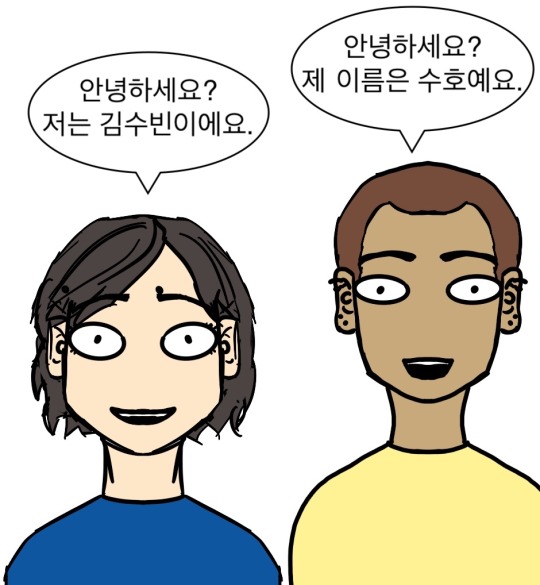
안녕하세요? 저는 김수빈이에요. Hello, I’m Subin Kim.
*수빈 ends with the consonant ㄴ, so 이에요 must be used.
안녕하세요? 저는 수호예요. Hello, I’m Suho.
*수호 ends with the vowel ㅗ, so 예요 must be used.
Or, you can use the words 제 이름 (my name) like in the picture above.
안녕하세요? 제 이름은 김수빈이에요. Hello, my name is Subin Kim.
안녕하세요? 제 이름은 수호예요. Hello, my name is Suho.
입니다 is used in formal speeches or maybe at a company, or sometimes between men. (Women don’t use it as often in informal situations). You might see it often on the news or when idols introduce themselves on TV shows.
For example:
안녕하세요? 저는 유키입니다. Hello, my name is Yuki.
Or you can use the more advanced phrase (이)라고 하다 (I am called).
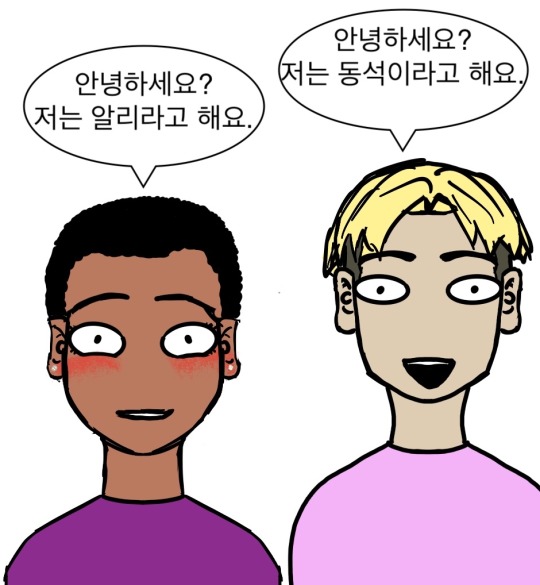
안녕하세요? 저는 알리라고 해요. Hello, I’m called Allie.
*알리 ends in the vowel ㅣ, so 라고 하다 is used.
안녕하세요? 저는 동석이라고 해요. Hello, I’m called Dongseok.
*동석 ends in the consonant ㄱ, so 이라고 하다 is used.
As with the first introductions, 라고 하다 is attached to names that end in a vowel, and 이라고 하다 is attached to names that end in a consonant.
“I’m called NAME” might sound a little awkward in English, but it’s a really common way to introduce yourself. *The phrase “name(이)라고 부르다(불러요)” is taught in some books, but is not a common introduction. You might use it to say: My name is Thomas, but please call me Tom. 제 이름은 토마스지만 톰이라고 불러 주세요.*
For school clubs or slightly more formal introductions, it’s common to use the formal version of (이)라고 하다, which is (이)라고 합니다. It’s used often if you’re introducing yourself in front of many people at one time like when joining a school club or being forced to introduce yourself to a class.
For example:
안녕하세요? 저는 제임스라고 합니다. Hello, I’m called James.
And now you might be wondering about an informal way to introduce yourself. Well, I’ve got you covered. You can say 안녕 (informal hi) and then you can add 이야 to the end of your name if it ends with a consonant and 야 to the end of your name if it ends in a vowel.
Or you can use the intimate speech level with (이)라고 하다, which is (이)라고 해.
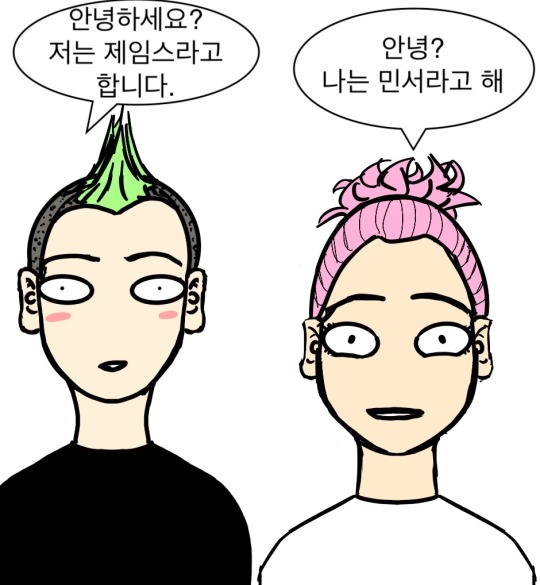
For example:
안녕? 나는 수호야. Hi, I’m Suho.
안녕? 나는 동석이야. Hi, I’m Dongseok.
안녕? 내 이름은 알리야. Hi, I’m Allie.
안녕? 나는 민서라고 해. Hi, I’m called Minseo.
But, honestly, unless you were meeting a child, you probably wouldn’t introduce yourself this way. And even then, the child wouldn’t use your name, so you might not even say it. Even though it’s common to use informal speech (반말) to people younger than you, most people start talking in formal speech because it is polite, and you’re not close yet.
But people who meet in elementary to high school might greet this way, because they know their classmates are the same age as they are. So, you’ll see this informal introduction in high school dramas or webtoons.
And if you’ve read to this point, you’re probably thinking all this is great, but there are so many options. What one do I use? So, here’s my personal opinion. I think the best two options on this list are 저는 ㅇㅇ예요/ㅇㅇ이에요 for beginners and 저는 ㅇㅇ(이)라고 해요 for anyone. The first one is simple and absolutely acceptable, and the second one, while being extremely common, sounds a bit more advanced and natural. So, you can show off your skills a bit. And if you’re introducing yourself in front of a class or something, 저는 ㅇㅇ(이)라고 합니다 is a great choice.
If you have any questions, leave a comment.
And follow me for useful Korean lessons and tips!^^
Post link
This is a post I made when I first started this blog, but I thought I’d bring it back since it’s a really great word. 부지런하다 is a word that you hear quite often in Korea. It normally translates to diligent or hard working.
It’s used all the time as a response to hearing that you’re doing something that’s good for your mind or body.
So, if you wake up early to exercise or study instead of watching Netflix, you’re probably going to hear the phrase: 부지런하네요~
Here are two examples.
오늘 아침에 일찍 일어나서 운동했어요. I woke up early and exercised this morning.
우와 정말 부지런하네요. Wow, you really work hard./You’re really diligent.
우리 오빠는 숙제를 미리 하는 편이에요. 저보다 부지런하죠?ㅋㅋ My older brother always does his homework in advance. He works a lot harder than I do, huh? Haha
It’s basically used to praise someone for something that most people are too lazy to do or don’t like doing. It’s a great word. After learning this phrase, I realized why my Korean friends used the word “diligent” so often.
Anyway, as always! Follow me for more Korean language posts.
Post link
Today I have another 속담(proverb/old saying). 산 넘어 산이다.
This one is one of my favorites. Life is full of challenges one after another. And this proverb illustrates just that feeling.
So, let’s first break 산 넘어 산이다 down. 산 means mountain(s), 넘다 means to climb over, pass, cross, and 산이다 is 산(mountain) plus the copula 이다 (similar to “to be”).
산 넘어 산이다. Literally means something like “there is (another) mountain after going over a mountain.”/ “Go over the mountain and there is another mountain.”
It’s used to express discontent that there is “one problem/challenge after another.” Once you finish one challenge, another one appears.
So, like the pictures, American college students are in a debt crisis. So, it’s probably pretty relatable for some of you. I just struggled to get through college! So, now I should be okay. But, the moment I finish my first challenge (getting through college), I’m immediately faced with another challenge (paying off college debt).
With life always putting new problems, barriers and challenges in front of us, this is a great expression. Here are some examples.
산 넘어 산이라고 대학교를 졸업하자마자 학비를 갚아야 돼요. “It’s just one challenge after another.” As soon as I graduate, I have to repay my school costs.
인생은 쉽지는 않지. 산 넘어 산이라고 하잖아. Live isn’t easy. They say it’s one hardship after another you know.
A: 민경아, 취직했다면서? 축하해! Mingyeong. I heard you got a job? Congratulations!
B: ㅋㅋ 고마워..취직을 하긴 했는데 다음 주 영어 시험을 봐야 된대. 산 넘어 산이야. haha Thank you…I did get a job, but they said I have to take an English exam next week. It’s just one thing after another.
Let me know if you have any questions. Good luck studying everyone! I hope you don’t have too many mountains to cross while studying Korean!
Post link
Hey guys, today I have two interesting verbs for you.
새우다 and 피우다. The reason they are interesting is that you often don’t see them in their “correct” form while talking. Some of you might have even noticed this or wondered why you don’t see 새우다 and 피우다 often or if there is a difference.
In textbooks you’ll learn sentences like:
어제 밤을 새워서 공부했어요. I stayed up all night studying yesterday.
But, you don’t hear that sentence too often in real life conversations with friends. Instead, you hear this:
어제 밤을 새서 공부했어요. I stayed up all night studying.
Or
밤을 샜어요. I stayed up all night./I pulled an all-nighter.
In class, newspapers, and in the dictionary, you will (or should) find the verb as 새우다. But, most people (at least in Seoul) use the verb as 새다. 우 completely disappears. 피우다 is the same. In the dictionary and in your books, you’ll see 담배(를) 피우다 and 바람(을) 피우다. But, many people say 담배(를) 피다 and 바람(을) 피다.
밤을 새다 is technically incorrect. But, you’ll hear it more often than the correct version. It’s kind of like “who and whom” in the US. Most people don’t use “whom” at all. They use “who” incorrectly even if they know it’s wrong. That’s because for some weird reason using “who” wrong sounds more natural than using “whom” correctly.
Here are a few examples of the three most common words I’ve come across.
담배를 안 폈으면 좋겠어요. (*안 피웠으면) I wish you didn’t smoke cigarettes.
밤을 새지 마. 숙제는 내일 해. (*새우지 마) Don’t stay up all night. Do your homework tomorrow.
남자 친구가 바람을 피면 끝이야! (*바람을 피우면) If (my) boyfriend cheats, it’s over/it’s the end.
It’s strange that language sometimes sounds better when it’s wrong, right? Just one more reason to not stress about speaking “perfect Korean.” You should use the correct form when writing papers and on tests, but when you’re talking or texting, feel free to use it “incorrectly.”
Anyway, good luck studying guys!
Post link
Hi guys, today I have a little 말장난 (pun, word play) for you.
In the picture, the guy in green says “석준아, 내 말 좀 들어 줘!” and then gives 석준 a horse. This is a common 짤 (meme) that you can find in google images for Korean puns.
말 means both “words” or “horse.” And the phrase 들어 주다 can mean “to listen to someone” or “to hold something for someone.” (듣다 to listen/들다 to hold something)
So, “내 말 좀 들어 줘” could be translated two different ways. “Please listen to what I have to say” or “please hold my horse.”
But, you know…you will probably never say “please hold my horse.” (unless it’s a toy horse?)
Either way, I recommend looking up the 짤. You can save it and send it to a Korean friend when you want to tell them something.
Anyway, good luck studying everyone~!
Post link



Hey guys! I know it’s been a really long time since I posted anything. I thought I’d have so much time this summer to work on my blog, and things just haven’t turned out that way. While on vacation, my girlfriend and I suddenly found out we had to prepare for her visa interview 3 weeks earlier than it was scheduled. We’re actually engaged. Unfortunately, we can’t get married here, so we are preparing to go the US together. It’s been quite a process. And therefore, I have been preparing to go home. And my room even had water pouring through the ceiling at one point. It’s been a really long month haha.
But I’m happy to say that everything turned out well. And I have a little comic of my girlfriend and me. I thought it might be some good reading practice. It’s written really naturally at the upper-intermediate level. I hope you like it! (It’s based on a true story…I hate doing dishes.) If you guys like it, I will post more. They’re fun to draw for me.
It also fits in great since it’s Pride month! Although, it’s slightly late. Happy Pride everyone!
Here is a translation of the comic.

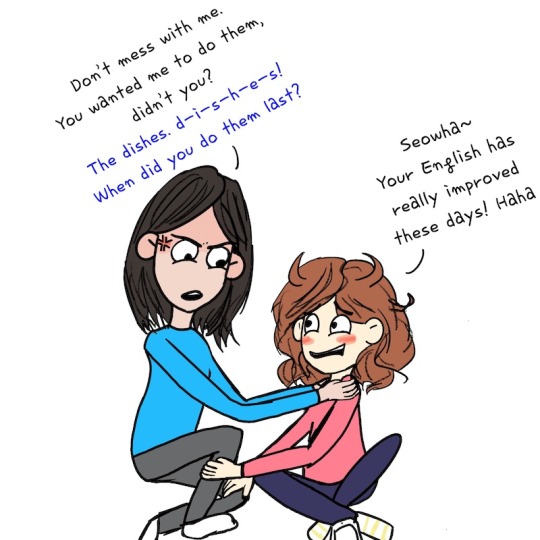

Notes:
시키* is a much cuter and softer version of the curse word 새끼 (bastard). It’s something we use with each other, but I don’t use it with anyone else. Swear words should always be used with caution. ^^
*간지러 is used instead of 간지러워 (간지럽다 to be itchy, ticklish). Sometimes words ending in “럽다” are shortened like this, especially the faster you want to get the words out. It’s technically incorrect, but you’ll hear it. For example, sometimes you hear 시끄러! instead of 시끄러워 (시끄럽다 to be loud, noisy).
Anyway, I hope everyone is having a good summer so far!
Hi guys~ today’s post is a Korean 속담 (proverb, old saying).
백지장도 맞들면 낫다.
First, let’s break it down.
백지장 white paper / 도 also, too / 맞들다 to lift up something together / (으)면 “if/when” grammar / 낫다 to be better
You could literally translate it as “It’s better if you lift up even a sheet of paper together.”/ “If you lift up a white sheet of paper together, it’s better.”
It’s similar to “many hands make light work” or “two heads are better than one.”
A piece of paper is incredibly light, but even something that light is easier to lift if two people do it together. So, this is an expression about working together to make a task easier. Here are some examples of how to use it.
(If someone is telling you you don’t have to help) 아냐 아냐 나도 도와줄게. 백지장도 맞들면 낫잖아! No, no. I’ll help you (too). Many hands make light work, you know.
백지장도 맞들면 낫다고 제가 도와드릴게요. They say many hands make light work; I’ll help you.
왜 혼자서 하려고 그래? 백지장도 맞들면 낫다는 말도 있잖아. 같이 하자. Why are you trying to do it yourself? They say many hands make light work. (Lit: You know there is an expression/words “many hands make light work.”) Let’s do it together.
Good luck studying guys!
Post link
Hi guys~ I’ve mentioned before that learning hanja is a great way to expand your vocabulary and also to understand vocabulary on a deeper level. Today, I have two different hanja that are used to represent the word “사람” or “person.”
The first one is 사람 인 人.
인간 human / 타인 other person, stranger / 성인 (adult person) adult
인재 talented person (재 for 소질 talent, aptitude for / 재능 talent)
한국인 Korean (person) / 외국인 foreign person / 인구 (인 person, 구 mouth - like the number of mouths to feed) population / 애인 (애 love, 인 person) lover, boy/girlfriend
If you remember learning 힘 력 力 (power), then you can use that to understand the word 인력 人力 (manpower). It’s often seen in the work force as 인력 필요하다 to need people to work/manpower.
There is also 사람 자 者.
부자 rich person *So in the picture with the lipstick, the person says “이 립스틱이 십만원이라고? 싸네…더 비싼 걸 보여 주세요. This lipstick is 100,000 won? (about 100 US dollars) That’s cheap…please show me a more expensive one.
환자 patient / 소비자 consumer / 피해자 victim / 노동자 (노동 labor 자 person) laborer
희생자 victim (“희생 sacrifice 자 person”) / 기자 newspaper journalist
약자 weak person (typically used to refer to women, children, and the elderly)
범죄자 (crime person) criminal / (비)흡연자 (non)smoker (lit: (비 not) 흡 taking in/drinking 연 smoke 자 person)
Don’t worry about the difference between 사람 인 and 사람 자. These are just the hanja that appear in vocabulary words. There is no “difference,” but you cannot change them. It’s impossible to change 한국인 to 한국자. You have to use 한국인.
Good luck studying everyone! Follow me for more Korean lessons.
Post link


(으)면 좋겠다 is a power grammar point. It’s at the (lower) intermediate level, but it’s used all the time. It’s a core grammar point in my opinion, and you definitely need to master it.
(으)면 좋겠다 is attached to both verbs and adjectives to express one’s wishes or hopes. Many beginner students try to say “I wish/hope” by translating the word to 소원을 빌다/희망하다/바라다 or the grammar point -기를 바라다. And while they aren’t exactly wrong, it’s really easy to use them awkwardly or incorrectly in everyday situations.
And that’s why, I’d like to introduce (으)면 좋겠다. It uses (으)면 “if” and 좋겠다 “would be nice” to mean “I wish” or “I hope,” even though “wish” and “hope” aren’t always interchangeable in English. This grammar point can be used to express both. It literally expresses “I would be nice if…” One of the interesting parts of this grammar point is that context is super important when translating it. It can be used in a lot of situations unlike the English words “wish” or “hope” which have more distinguished differences.
And if you already learned (으)면 “if/when,” then you already know how to conjugate it! Words ending with a consonant use -으면 좋겠다, and words ending with no consonant use -면 좋겠다.
Verbs/Adjectives
하다 —> 하면 좋겠다 vs. 먹다 —> 먹으면 좋겠다
크다 —> 크면 좋겠다 vs. 없다 —> 없으면 좋겠다
Here are some examples.
내일 시험을 잘 보면 좋겠어요. I hope I do well on the test tomorrow. (시험을 잘 보다 - to take a test well, do well on a test)
전 여자 친구가 앞으로 나랑 연락을 안 하면 좋겠어. I hope my ex-girlfriend doesn’t contact me anymore.
둘이 항상 싸우더라고…헤어지면 좋겠어 Those two always fight…I wish they’d break up.
오늘 비가 오면 좋겠어요. I hope it rains today./It’d be nice if it rains today.
It’s also common to see this grammar used in the past tense, 았/었/였으면 좋겠다. I would actually argue that it’s more common to see it in the past tense (in my experience that is). Luckily, its core meaning doesn’t change. Textbooks are a bit hazy on the difference between the two. But some books say it’s just a little bit stronger. Think of it as a little more emphasis on your wish. (Just remember that this form is used a bit more. And the difference is really arbitrary in regards to its usage.)
너는…그런 말을 안 했으면 좋겠어. 너는 예쁘잖아. I wish you wouldn’t say that (words like that). You’re pretty…
A 아이돌이 나랑 사랑에 빠졌으면 좋겠다~ I wish idol A would fall in love with me.
내 생일 파티에 왔으면 좋겠어요. I hope you come to my birthday party./I wish you would come to my birthday party./It’d be great if you came to my birthday party.
좋은 대학교에 합격했으면 좋겠어. I hope I get accepted into a good school.
걔가 좀 조용했으면 좋겠어. I wish he would be quiet. (*note: this is not a nice thing to say~^^)
It can also be used with the copula 이다 and 아니다.
올해 우리 선생님이 남자였으면(남자면) 좋겠어. I hope our teacher is a man this year.
올해 우리 선생님이 남자가 아니었으면(아니면) 좋겠어. I hope our teacher isn’t a man this year.
You can also use (으)면 하다 instead of (으)면 좋겠다. (으)면 하다 tends to be used more often in formal speech. But the meaning remains the same.
*Note: (으)면 하다 can be used in casual speech, but (으)면 좋겠다 isn’t really used in formal speech.
여러분, 이 발표를 재미있게 보셨으면 합니다. Everyone, I hope you all enjoy this powerpoint.
주연 씨는 좀 더 일찍 수업에 오셨으면 해요. Miss Juyeon, I wish you would come to class a little bit earlier.
(이웃에게) 죄송한데요. 저희 아들이 강아지 털 알레르기가 있거든요. 그래서 강아지랑 놀지 않았으면 해요. (To a neighbor) I’m sorry. You see, our son has a dog fur allergy. So, I hope he doesn’t play with the dog. (And in context, that would equal~ I hope you don’t let him play with the dog.)
Let me know if you have any questions.
Good luck studying everyone! Follow me for more lessons and tips~
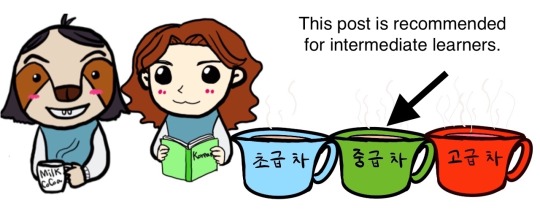
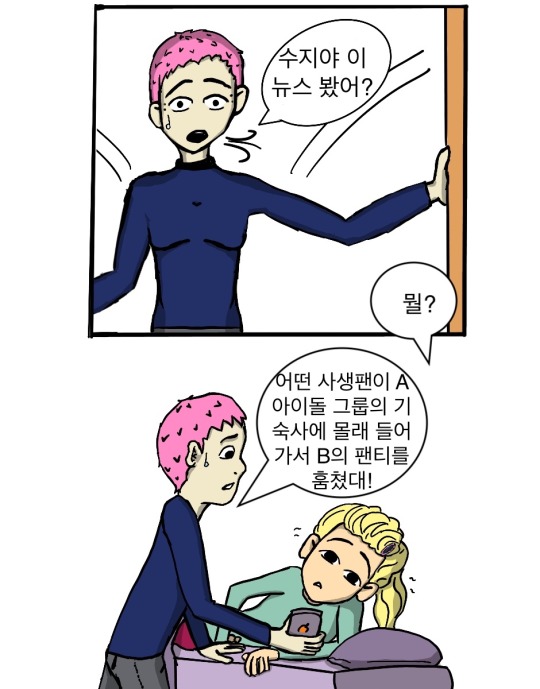

Translation:
수지야 이 뉴스 봤어? Suzie, did you see this (news)?
뭘? What?
어떤 사생팬이 A 아이돌 그룹의 기숙사에 몰래 들어가서 B의 팬티를 훔쳤대! Some stalker fan snuck into A idol’s dorm and stole B’s underwear.
미친…제정신이 아닌가 봐. No f**king way…they’re out of their mind.
Notes
*사생팬
사생(활) is one’s private life. And 팬 is the English loan word for “fan” of an artist or something. Together 사생팬 describes a fan that invades the private life of a star or artist (often to an unbelievable degree) (사생팬: 유명한 사람의 사생활을 침해하는 팬). And with Kpop as crazy as it can be, sometimes fans do unacceptable things like sneaking into a famous celebrities house or stalking them. They can be described as a 사생팬.
*훔쳤대 Someone said someone stole (something)/I heard that someone stole (something)
(V-ㄴ/는대(요) or A-대(요)) is the contracted form of ㄴ/는다고 해(요) and 다고 해(요). This grammar point is for conveying speech that one heard from someone else.
For example:
My mom says it’s okay. 엄마는 괜찮대. (엄마는 괜찮다고 해/했어.)
My sister says she isn’t going. 언니는 안 간대요. (언니는 안 간다고 해요/했어요.)
This contracted form is used all the time in casual speech since it’s shorter. It can be used in the past tense 댔어(요), but it’s used in the present more often. It’s the difference between “My mom says it’s okay” and “My mom said it’s okay.” There really isn’t a huge difference in the message you want to convey.
*팬티
The English loan word panty (팬티) can be used for anyone’s underwear regardless of age or gender. I don’t know about other countries, but I had never heard panty used for underwear that wasn’t for adult women. So, I was a little surprised when I first heard it used for men’s underwear.
*미친
미치다 means to be crazy. And 미친 can be used as an abbreviated way to say that’s crazy/insane or respond to something like “no f–ing way” or “holy shit.” (미쳤다, 미친 사건, 미친 새끼) I’m not quite sure how this abbreviated form came to be, but it’s really common. *I would also like to mention here that 미치다 “to be crazy” is quite a bit more negative in Korean than it is in English. It’s used a lot more often as a curse. It’s can be used lightly among friends, but you should be quite close, as the nuance or intonation could hurt someone’s feelings.
*제정신
제정신 is one’s “right mind.” So, 제정신 아니다 would mean “to not be in one’s right mind.” So, if someone does something that’s kind of crazy or unacceptable, you might be able to use this word. 그 사람이 경찰 앞에서 물건을 훔쳤다고요? 제정신이 아닌가 봐요. (You’re saying) that person stole something right in front of the cops? They’re out of their mind.
I hope you enjoyed this post. Let me know if you have any questions!
It’s been a while since my last post, but I’m going to get back into the rhythm of things!
Follow me for more lessons.^^


